
Social Text
metrics 2024
Exploring the Intersections of Culture and Society
Introduction
Social Text, published by DUKE UNIVERSITY PRESS, is a leading peer-reviewed academic journal that has established itself as a critical platform for interdisciplinary research in the fields of Anthropology, Cultural Studies, and Gender Studies. With its impressive ranking in the Q1 category for each of these disciplines in 2023, it occupies a prominent place within the academic landscape—ranked 33rd out of 1304 in Cultural Studies and significantly within the top 20 in both Anthropology and Gender Studies. The journal publishes innovative theoretical and empirical work that challenges and expands upon conventional methodologies and perspectives, aiming to foster a deeper understanding of social phenomena. While Social Text is not an open-access journal, it remains easily accessible through university libraries and academic institutions, ensuring that cutting-edge scholarship reaches a wide audience. This journal is a vital resource for scholars, researchers, and students looking to stay informed about the latest trends and debates within the humanities and social sciences.
Metrics 2024
 0.86
0.86 1.20
1.20 3.10
3.10 11
11Metrics History
Rank 2024
Scopus
IF (Web Of Science)
JCI (Web Of Science)
Quartile History
Similar Journals
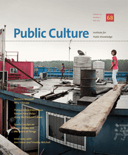
PUBLIC CULTURE
Illuminating the Complexities of Contemporary Culture.PUBLIC CULTURE is a distinguished journal published by DUKE UNIVERSITY PRESS, known for its critical engagement with contemporary cultural studies and interdisciplinary scholarship. As a leading platform since its inception in 1996, PUBLIC CULTURE examines the intersections of culture, politics, and various social paradigms, fostering dialogue that challenges conventional wisdom and encourages innovative perspectives. With an impact factor that reflects its robust academic contribution, the journal is indexed in Scopus and spans multiple disciplines, ranking within the top quartiles in Arts and Humanities as well as Communication. Although it operates under a traditional subscription model, its scholarly output significantly influences fields within social psychology and related areas, making it an essential resource for researchers, professionals, and students seeking to engage with the dynamic landscape of public culture. With its commitment to publishing high-quality articles that explore the complexities of cultural phenomena, PUBLIC CULTURE remains a vital conduit for scholarly exchange and discovery.

Boletin de Arte-UMA
Unveiling Cultural Narratives Through ArtistryBoletin de Arte-UMA is a distinguished academic journal published by the University of Malaga, Department of History of Art, focusing on the rich interplay between history, visual arts, and performing arts. Operating under an Open Access model since 2013, this journal ensures that valuable research is freely available for scholars and practitioners worldwide. With an impact factor currently reflecting its academic rigor through its Q2 ranking in History and Q1 ranking in Visual Arts and Performing Arts, Boletin de Arte-UMA serves as a vital platform for cutting-edge research, critical analysis, and the promotion of cultural heritage studies. Based in Malaga, Spain, the journal not only provides insights into its thematic scope but also fosters a global dialogue among researchers, professionals, and students passionate about the visual and performing arts.
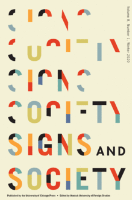
Signs and Society
Decoding Communication in a Complex WorldSigns and Society is an acclaimed academic journal published by University of Chicago Press, specializing in the interdisciplinary exploration of semiotics, cultural representations, and communication practices. With an impressive ISSN of 2326-4489 and E-ISSN 2326-4497, this journal has established itself as a credible source of research and insight within its fields. It operates under a robust framework with a convergence of topics from 2015 to 2024, and has achieved notable rankings, including Q1 placements in Cultural Studies, Linguistics and Language, and Visual Arts and Performing Arts in 2023, elevating it to a leading status among its peers. The journal’s impact is reflected in its Scopus rankings, positioning it in high percentiles across diverse categories, making it a vital resource for scholars, practitioners, and students interested in the intricate relationships between signs, society, and culture. Although not an open access publication, Signs and Society remains essential for those seeking to deepen their understanding of communication dynamics and the multifaceted dimensions of cultural expression.
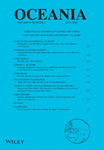
OCEANIA
Navigating the Complexities of Anthropology and ScienceOCEANIA, published by WILEY, is a distinguished journal that has been fostering scholarly discourse in the fields of anthropology and the history and philosophy of science since its inception in 1930. With an impressive impact factor and secure positions in the Q2 quartile for both categories, OCEANIA stands out as an influential resource for researchers and professionals alike. Its latest Scopus rankings reflect its commitment to quality, placing it in the 76th percentile for history and philosophy of science and the 66th percentile for anthropology. Though it does not operate under an open access model, the journal provides robust access options for institutions and individuals to explore its rich array of peer-reviewed articles that contribute to the understanding of cultures and scientific thought across the Pacific region and beyond. As we advance toward its continued convergence into 2024, OCEANIA remains a pivotal platform for innovative research and academic debate, cultivating insights that are crucial for scholars and students navigating the complexities of these interconnected disciplines.

Departures in Critical Qualitative Research
Challenging Boundaries in Communication and Language StudiesDepartures in Critical Qualitative Research, published by University of California Press, is an influential journal dedicated to advancing knowledge within the realms of Communication and Linguistics and Language. With its commitment to exploring the complexities and nuances of qualitative research, this journal has quickly established itself as a vital resource for scholars and professionals alike. Although it currently resides in the fourth quartile in Communication and the third quartile in Linguistics, its notable Scopus rankings, including a 64th percentile in Language and Linguistics, highlight its growing significance in the academic discourse. Covering a converged period from 2019 until 2024, the journal seeks to foster innovative and critical perspectives on qualitative methodologies, offering invaluable insights that address contemporary social issues. Access to its content is available to a wide audience, contributing to the journal's reputation as a beacon for those engaged in critical qualitative research.
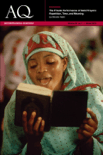
ANTHROPOLOGICAL QUARTERLY
Advancing Ethnographic Insights for TomorrowANTHROPOLOGICAL QUARTERLY, published by the George Washington University Institute of Ethnographic Research, stands as a vital resource in the field of anthropology and broader arts and humanities studies. With an ISSN of 0003-5491 and an E-ISSN of 1534-1518, this esteemed journal has been contributing to academic discourse since its establishment in 1981. The journal holds a respected position in both the Q2 category for Anthropology and the Q2 category for Arts and Humanities (miscellaneous), demonstrating its impact and relevance, as evidenced by its rank of #152 out of 502 in the Social Sciences sector for anthropology and rank of #179 out of 552 in the Arts and Humanities field. Researchers, professionals, and students can rely on ANTHROPOLOGICAL QUARTERLY for rigorous peer-reviewed articles that push the boundaries of ethnographic research and anthropological theory, addressing contemporary issues with scholarly precision. The journal’s commitment to fostering critical analysis and interdisciplinary perspectives establishes it as an essential platform for advancing knowledge within its diverse and dynamic field.

DIALECTICAL ANTHROPOLOGY
Exploring the Intersections of Culture, Society, and PoliticsDIALECTICAL ANTHROPOLOGY, published by SPRINGER, is a prestigious journal within the field of anthropology, recognized for its substantial contributions to dialectical and critical theory in social research. Since its inception in 1975, the journal has carved a niche by exploring the intersections of culture, society, and politics, making it an essential resource for scholars and practitioners. With an impact factor that places it in the Q2 category for both anthropology and arts and humanities, and significant rankings in sociology and political science, it reflects a solid scholarly reputation. The journal operates on a subscription basis, allowing for a wide dissemination of rigorous academic research without open access. With ISSN 0304-4092 and E-ISSN 1573-0786, DIALECTICAL ANTHROPOLOGY serves as a crucial platform for fostering dialogue and advancing knowledge in contemporary anthropology and related disciplines. As a researcher, professional, or student, engaging with the insights presented in this journal will deepen your understanding of the dynamic interplay between structural and agency-oriented perspectives in social contexts.
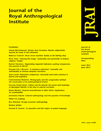
JOURNAL OF THE ROYAL ANTHROPOLOGICAL INSTITUTE
Advancing Anthropological Scholarship Since 1995JOURNAL OF THE ROYAL ANTHROPOLOGICAL INSTITUTE, published by Wiley, stands as a prestigious platform for scholarly discourse in the field of anthropology. With an ISSN of 1359-0987 and an E-ISSN of 1467-9655, this journal has been a vital resource for researchers, professionals, and students since its inception, featuring contributions that push the boundaries of understanding in both cultural and social anthropology. The journal’s rigorous peer-review process affirms its high academic standards, reflected in its top-tier Q1 rankings in both the Anthropology and Arts and Humanities categories for 2023. With a current ranking of #78 out of 502 in Social Sciences Anthropology and #138 out of 552 in Miscellaneous Arts and Humanities, it inhabits a critical space within academia, addressing seminal issues and innovative research. While the journal is not open access, it remains accessible to those affiliated with institutions that provide subscriptions, ensuring that groundbreaking anthropological insights are disseminated widely within the academic community. As it converges from 1995 to the present, the JOURNAL OF THE ROYAL ANTHROPOLOGICAL INSTITUTE continues to shape the landscape of anthropological research, engaging a diverse readership eager to explore the intricate tapestry of human cultures.

LIBERTE
Cultivating Scholarly Dialogue in Literature and BeyondLIBERTE is a distinguished academic journal that serves as a platform for critical thinking and scholarly discourse across various fields including Literature and Literary Theory, Philosophy, Sociology and Political Science, and Visual Arts and Performing Arts. Established in Canada and published by LIBERTE, this journal aims to foster intellectual exchange and explore the nuances of cultural and social narratives. Although it currently falls in the Q4 quartile across its categories, it is dedicated to advancing the conversation in the arts and humanities, providing a rich resource for researchers, educators, and students alike. With an ISSN of 0024-2020 and an active publication cycle running from 2002 to 2024, LIBERTE welcomes contributions that challenge prevailing ideologies and reflect innovative perspectives. While the journal is not open access, its value in promoting academic inquiry within its communities cannot be overstated.
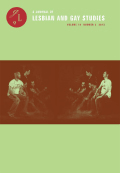
GLQ-A JOURNAL OF LESBIAN AND GAY STUDIES
Fostering interdisciplinary dialogue on LGBTQ+ issues.GLQ: A Journal of Lesbian and Gay Studies, published by Duke University Press, is a pioneering academic journal that has made significant contributions to the critical discourse around LGBTQ+ issues since its inception in 1996. With an ISSN of 1064-2684 and an E-ISSN of 1527-9375, this esteemed publication engages a wide audience of researchers, professionals, and students in cultural studies, gender studies, and queer theory. Ranked in Q2 for Cultural Studies and Q3 for Gender Studies in 2023, GLQ is recognized for its rigorous scholarship and innovative approaches to the study of sexuality and identity. The journal offers an invaluable platform for interdisciplinary dialogue, exploring the complexities of LGBTQ+ lives, cultures, and movements. Although not open access, GLQ remains a vital resource for those looking to stay at the forefront of scholarship in these dynamic fields. Whether you are a seasoned researcher or a newcomer to queer studies, GLQ provides essential insights and fosters ongoing conversations that challenge and expand our understanding of sexuality and gender.